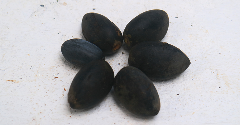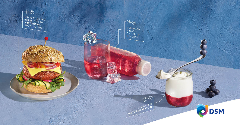Scientists create better-for-you bread
28 Mar 2016A team of food scientists from the National University of Singapore (NUS) says it has successfully formulated a recipe for making healthier bread by adding a natural plant pigment, called anthocyanin, extracted from black rice.

A team of food scientists from the National University of Singapore (NUS) says it has successfully formulated a recipe for making healthier bread by adding a natural plant pigment, called anthocyanin, extracted from black rice. This new bread option gets digested at a slower rate – hence improving blood glucose control – and is high in antioxidants, among other health benefits. This is said to be the first study where anthocyanin extract has been fortified into a bread product, and the findings open up new possibilities of creating healthier, diabetic-friendly food products.
Bread is a popular staple food for many people around the world. Most bread contains a high amount of rapidly digestible starch, and hence many of them have a high glycaemic index. Food high on the glycaemic index are rapidly digested and absorbed into the bloodstream quickly, causing a sharp increase in blood sugar levels and making them unsuitable for diabetic patients. In addition, rapid digestion of bread may result in people consuming more bread than required to make up the hungry feel. The excessive consumption of bread could increase the risk of overweight and obesity, and their associated diseases, such as Type II diabetes.The anthocyanin-fortified bread created by NUS researchers could potentially bring health benefits to consumers looking for a healthier option to normal bread. The findings of the study were published in the journal Food Chemistry in October 2015.Anthocyanins belong to the group of flavonoids that are naturally occurring pigments in fruits and vegetables, and are responsible for the orange, red, violet, and blue colours observed in nature. Fruits, such as blueberries, grapes, blackberries, as well as grains and vegetables like black rice and purple sweet potatoes, are naturally rich in anthocyanins.Scientific studies have shown that anthocyanins are rich in antioxidant properties and may help prevent cardiovascular and neurological diseases, cancer, and inflammation. Anthocyanins are also known to play a role in controlling obesity and diabetes as they can inhibit digestive enzymes and hence reducing blood glucose levels.“Despite their antioxidant capacity and associated health benefits, the knowledge of using anthocyanins as an ingredient in food products, particularly semi-solid products, is very limited,” said Professor Zhou Weibiao, Director of the Food Science and Technology Programme at the NUS Faculty of Science. “Hence, we wanted to explore the feasibility of fortifying anthocyanins into bread, to understand how it affects digestibility and its impact on the various quality attributes of bread.”Currently, approaches for developing health-promoting bread are dominated by adding whole grains and fibres in bread, partly aiming to slow down its digestion among several health benefits. “Reducing the digestion rate of the bread will lead to a lower glycaemic index and slower absorption of the bread’s carbohydrates,” said Dr Sui Xiaonan, a recent PhD graduate from the Food Science and Technology Programme at NUS and first author of the study. “This usually suggests a lower insulin demand, and could potentially improve long-term blood glucose control. Our study explores an alternative way of producing functional bread that delivers health benefits to consumers.”The NUS team, led by Prof Zhou, found that digestion rates of the anthocyanin-fortified bread reduced by 12.8 per cent, when 1 per cent of anthocyanin extract from black rice was added into the bread dough and baked at the optimal condition of 200 degree Celsius for 8 minutes. The digestion rate dropped further to 20.5 per cent, when the amount of anthocyanin extract increased to 4 per cent.Another area of interest for the team was to explore a way to incorporate anthocyanins into bread to improve its value as a health-promoting food. The team had previously conducted a study in 2014 to examine the degradation of anthocyanins during baking. They found that more than 80 per cent of the antioxidant capacity was retained in the bread crust and crumb, even when baked at temperatures as high as 240 degree Celsius for up to 12 minutes.“Our results demonstrate that it is indeed feasible to create functional food products through anthocyanin fortification, using bread as an example,” said Zhou. “We hope to conduct further studies to incorporate anthocyanins into other food items, such as biscuits. Our team is also keen to explore opportunities to work with industry partners to introduce the anthocyanin-fortified bread to the market.”Related news

Plastic packaging reduction requires industry rethink
6 Jan 2023
The food and beverage sector is calling for industry-wide collaboration and business model updates to reduce the environmental impact of plastic packaging.
Read more
Superfrau upcycles liquid whey for energy drinks
22 Dec 2022
US company Superfrau turns surplus whey into sustainable, upcycled-certified dairy products for the recovery drinks market.
Read more
Malaysian brand Nanka brings jackfruit range to Europe
21 Dec 2022
Malaysian brand Nanka is expanding to new Asian and European markets with its fast and ready-to-eat plant-based products based on jackfruit.
Read more
Ammonia emissions, Oreo cookies, and Olam
19 Dec 2022
Olam Food Ingredients (Ofi) and Mondelēz are under fire for using ammonium carbonate, an authorised food additive, in cocoa and Oreo cookies - but the accusations stem from greater concerns over industrial emissions of toxic ammonia and nitrogen oxide ...
Read more
Plant-based fish and seafood launches around the world
12 Dec 2022
From pea protein-based prawns to microalgae-based tuna alternatives, plant-based alternatives to fish and seafood are on the rise around the world.
Read more
‘Super nut’? Indonesia’s ‘best kept secret’ wins EU novel food approval
6 Dec 2022
A previously obscure, nutrient-rich Indonesian nut is set to hit European shelves after winning EU novel foods approval that could also help protect under-threat kenari forests on the archipelago.
Read more
FDA in ‘critical milestone’ for cell-cultured meat in US
18 Nov 2022
The US Food and Drug Administration (FDA) has completed its first pre-market consultation of a cell-cultured chicken product made by UPSIDE Foods, a development that has been hailed a “critical and inspiring milestone in the history of cultivated meat”...
Read more![Affordability, indulgence, and health: Top trends for 2023 [Interview]](/47/pdcnewsitem/11/94/03/FiE22%20Speaker%20Interview_Alex%20Beckett2.png)
Affordability, indulgence, and health: Top trends for 2023 [Interview]
14 Nov 2022
Consumers want affordable alternatives that offer the same great taste and health benefits as their favourite products. Brands that can deliver on this will dominate in 2023, according to Mintel.In the food and beverage space, consumers are key in driv...
Read more
Enjoy it all: DSM talks taste, texture and health in the run up to FiE 2022
10 Nov 2022
Enhancing plant-based applications in taste, texture and health, addressing trending health priorities and introducing efficiency improving technologies – don’t miss the chance to meet DSM at FiE.
Read more![Unilever aims to ‘make sustainable living commonplace’ with responsibly produced packaged goods [Interview]](/47/pdcnewsitem/11/93/47/th119347.png)
Unilever aims to ‘make sustainable living commonplace’ with responsibly produced packaged goods [Interview]
8 Nov 2022
Thanks to their sheer scale, multinational corporates can have a positive impact when they adopt sustainable practices. Unilever aims to do so via regenerative agriculture, plant-based products, food waste reduction, and nutrient fortification, says Do...
Read more